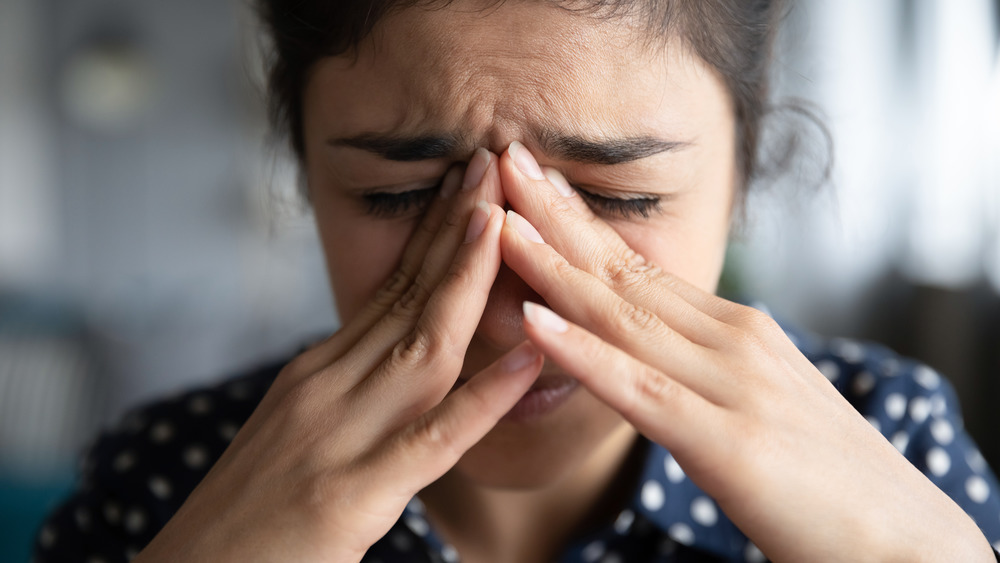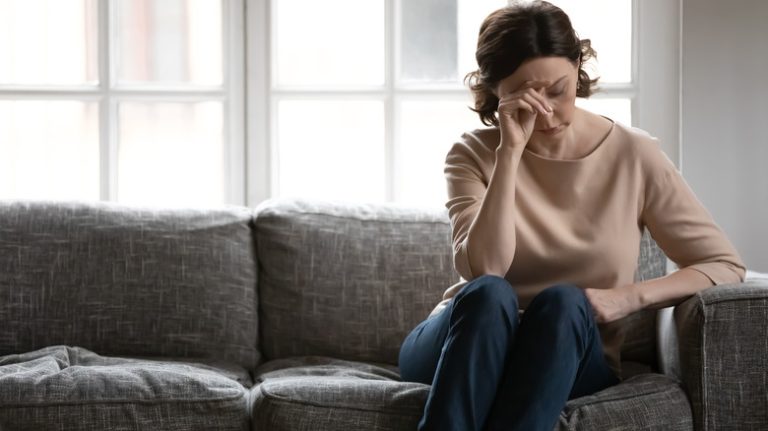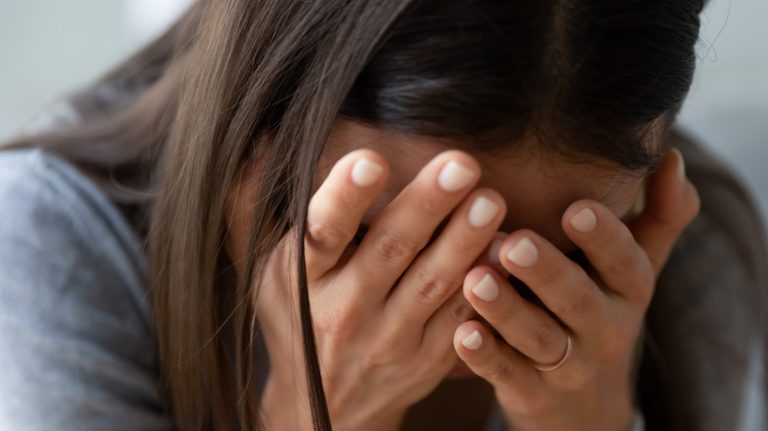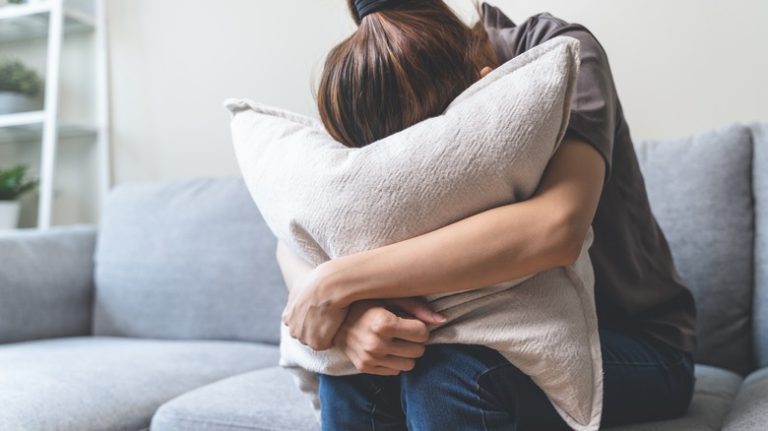When anxiety hits, it hits hard. If you’ve ever felt like your whole world was ending in a matter of minutes, you know what we’re talking about. An anxiety attack can last anywhere from a few minutes or a few hours to days or weeks on end, according to Talkspace, an online and mobile therapy company. Unlike panic attacks, which are sudden episodes of intense fear without any apparent cause, according to MedScape, anxiety attacks happen in response to specific stimuli or stressful situations.
Anxiety is totally normal, and anxiety attacks are really nothing more than intense spurts of that emotion. But they certainly don’t feel anything like emotional outbursts. The symptoms of anxiety can be physically crippling, leaving you paralyzed in fear and with debilitating pain. So what actually happens to your body when you’re having an anxiety attack? Read on to learn the science behind the toll anxiety attacks take on your physical and mental health.
You may start to feel an overwhelming nervousness
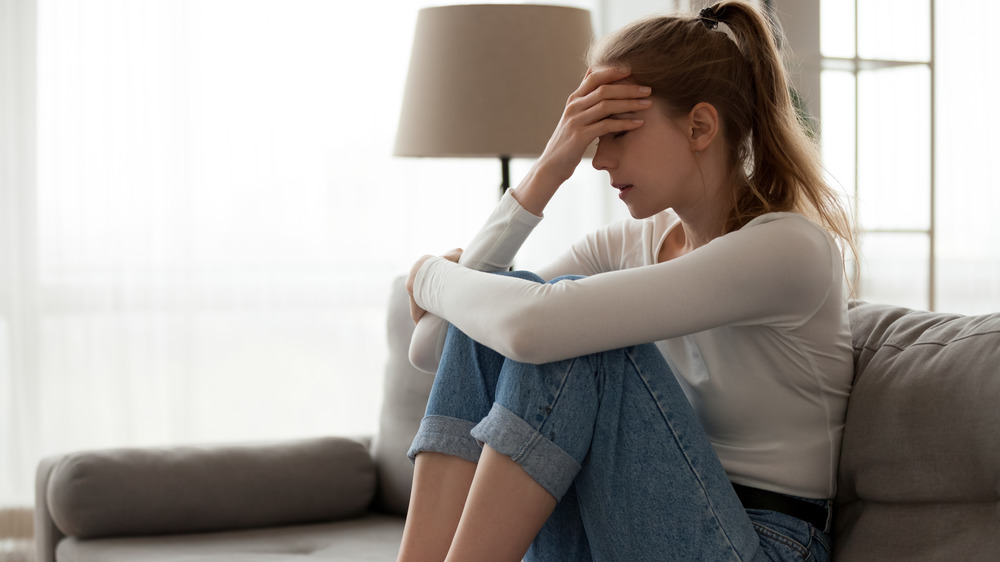
During an anxiety attack, you’ll likely feel an overwhelming sense of nervousness. You’ll probably feel restless or tense. Like there’s some sort of impending danger or doom coming your way, and you may not be able to pinpoint what. While this may all feel troubling, especially if you’re experiencing an anxiety attack for the first time, according to MayoClinic, amped up nerves are commonplace during an anxiety attack.
In fact, according to Better Help, an online therapy platform, the nervousness associated with anxiety attacks may even “mirror other scary medical problems.” You may mistake this feeling for heart issues or asthma, for example. But understanding this symptom is the first step to coping with it the next time that it happens. For example, if you start to get the nervous shakes or a speedy heartbeat from an anxiety attack again in the future, you may have an easier time calming yourself down if you’re not busy convincing yourself that you’re having a heart attack.
You’ll probably feel your heart rate speed up
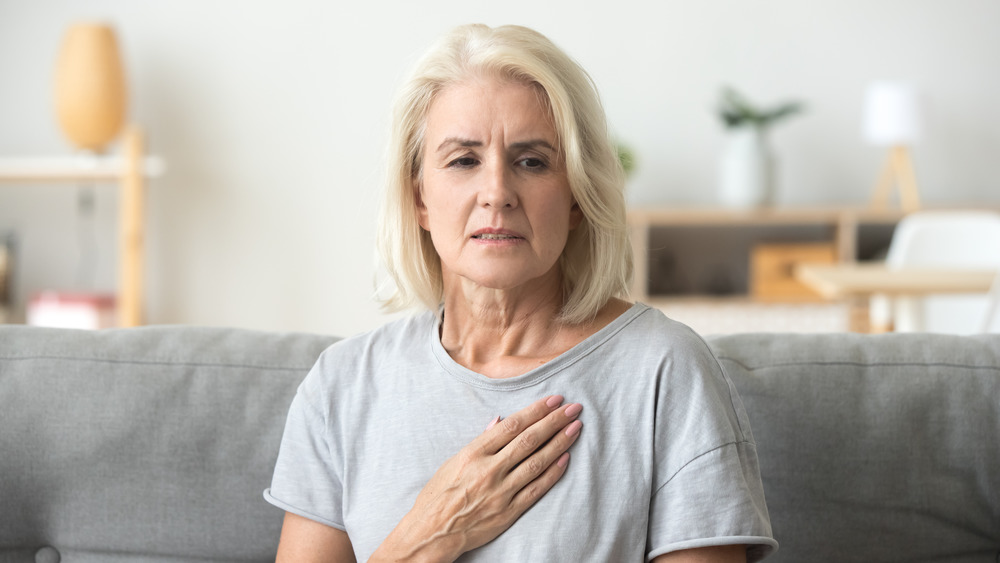
Chances are that, if you’re having an anxiety attack, your heart will tell you. You’ll almost certainly notice an increase and/or irregularity in your heart rate, according to MayoClinic. In many cases, your heart may feel like it’s beating so rapidly and loudly that it’s difficult to ignore. Of course, noticing and focusing on your heart speeding up or palpitating may only exacerbate your anxiety and, in turn, affect your heart rate even more.
An increased heart rate during an anxiety attack is normal, but it’s also important to slow your heart rate down with various calming practices like intentional breathwork, meditation, and the use of relaxing essential oils. If your heart beats too fast, it may struggle to pump enough blood to the rest of your body, starving your organs and tissues of the oxygen they need to function, according to MayoClinic.
You may experience some trouble breathing or rapid breathing
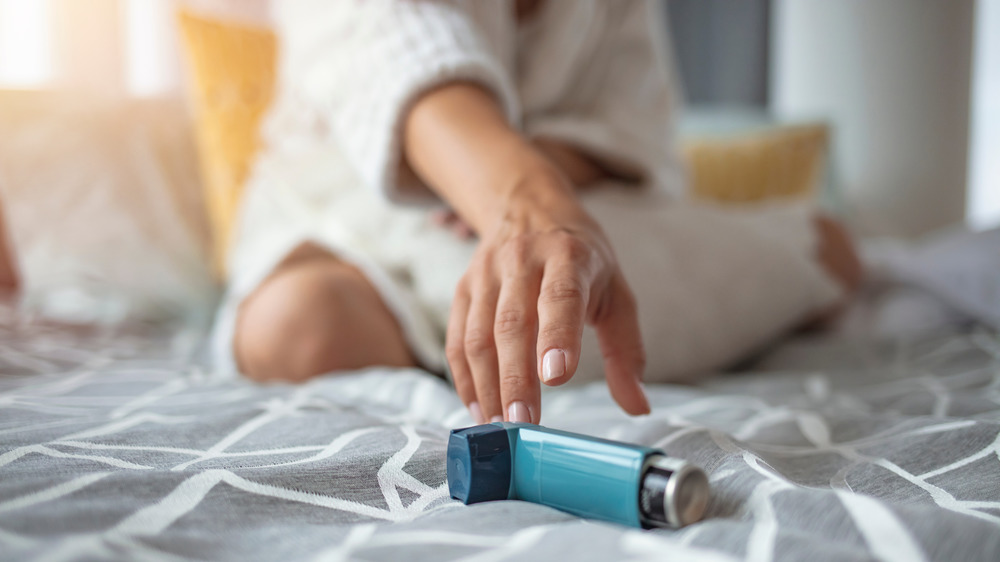
Shutterstock
One tell-tale sign of an anxiety attack is trouble breathing or rapid breathing, according to MayoClinic. If you’re feeling extremely anxious about an upcoming event, you may feel like it’s hard to catch your breath. This can lead to hyperventilation.
Hyperventilation refers to a condition in which you breathe very quickly, according to Healthline. While healthy breathing strikes a balance between breathing in oxygen and breathing out carbon dioxide, hyperventilating means exhaling more than inhaling, which leads to a “rapid reduction in carbon dioxide” in your body. Low carbon dioxide levels can narrow the blood vessels, slowing the supply of blood to the brain. When this happens, you may feel lightheaded and experience a tingling sensation. Severe hyperventilation can even make you unconscious, which is why it’s critical that you control your breathing the best you can.
Deeply and slowly breathing through your nose and into your abdomen (not your chest), and exhaling through your mouth, can help you calm down your breath, according to VeryWellHealth. There are a whole host of breathing techniques you can try, as well, from resonant breathing to alternate-nostril breathing, according to Healthline.
You may experience some gastrointestinal issues

Shutterstock
Gastrointestinal issues are not uncommon when it comes to anxiety attacks, according to MayoClinic. So, if you’re feeling intensely anxious about an upcoming event — whether that be a long-haul flight, an important presentation, a first date, or job interview, a big game, or another anxiety-inducing situation — you’ll probably experience stomach issues that send you straight to the bathroom. In fact, according to the Anxiety and Depression Association of America, there’s a significant brain-gut association that causes those sometimes nausea-inducing butterflies in your belly.
Your gut actually “contains the largest area of nerves outside [your] brain.” And your digestive tract and brain share many of the same nerve connections, which is why you feel like your stomach is in knots when you’re having an anxiety attack. So what exactly happens? Some of the hormones and chemicals that your body releases with anxiety leak into your digestive tract and have a negative effect on your gut flora (all those microorganisms that aid digestion), decreasing your antibody production. The result is a chemical imbalance that can show up as indigestion, cramps, diarrhea, constipation, nausea, irritable bowel syndrome (IBS), peptic ulcers, and changes in appetite.
You may feel like you’re detached from your own self

Shutterstock
Anxiety attacks often feel a lot worse than they actually are, and that’s largely because you may feel like you’re not even in control of your own body. Like you’re in a dream, witnessing whatever is happening to you without the capability to interfere with whatever it is.
Mental health author Gila Lyons describes her experience with depersonalization for Healthline. After months of anxiety and panic attacks, she says she ultimately decided to stop taking the subway to work in New York City and start walking. But, one day, during an attack, she started to feel detached from her body. “My hand looked garish and it panicked me to clearly feel the thought, move your hand, echo cavernously inside my head — and then see my hand move,” she explains. “The whole process that was supposed to be automatic, instant, and unnoticeable was broken down.” She felt like “an outside observer of [her] innermost processes, making [her] a stranger in [her] own body and mind.”
Feeling detached from your own self is typical during an anxiety attack, according to The Stress and Anxiety Center. This is called depersonalization.
You may start feeling things that aren’t real

Shutterstock
During an anxiety attack, you may start to feel like what’s happening around you is not real, according to the Anxiety and Depression Association of America. This is called derealization. If you’re experiencing derealization, you might feel like you’re losing your grip on reality or like you’re losing your mind altogether.
“The first time I felt it, I was walking down the streets of New York City…” recounts mental health author Gila Lyons of her own experience with derealization for Healthline. “Suddenly the buildings around me started to shimmer like their atoms didn’t hold together. They were too bright, immaterial, and shaking like flip-book cartoons.”
Derealization, while an unusual phenomenon, is not so rare. Neither you nor Lyons are alone in this experience. In fact, in a 2000 study published in the journal, Social Psychiatry and Psychiatric Epidemiology, researchers found that nearly one in four people report having a derealization experience at some point in their lives.
You may experience cold chills or heat waves

Shutterstock
During an anxiety attack, it’s not unusual to feel a change in body temperature, according to the Anxiety and Depression Association of America. It makes sense, then, that so many people describe their anxiety attacks as “chilling” experiences.
Cold or sweat chills may actually be an early sign of an anxiety attack on the horizon, according to Calm Clinic. They can occur for a number of reasons. For one, your body goes into a “fight-or-flight mode” when you’re having severe anxiety. Just before this happens, it automatically lowers your internal body temperature, giving you goosebumps, to prepare for the drastic spike in temperature during the fight or flight.
Likewise, because you may sweat when you’re feeling anxious, this process can cool you down. Another reason that you may be feeling cold or warm in certain areas of your body is because, during the fight-or-flight mode, your body redirects your blood flow to the areas that signal the greatest need for it (like the heart!). Decreased blood flow in certain areas can make those parts feel cooler, and increased blood flow in other areas can make those parts feel warmer.
You’ll likely feel out of control
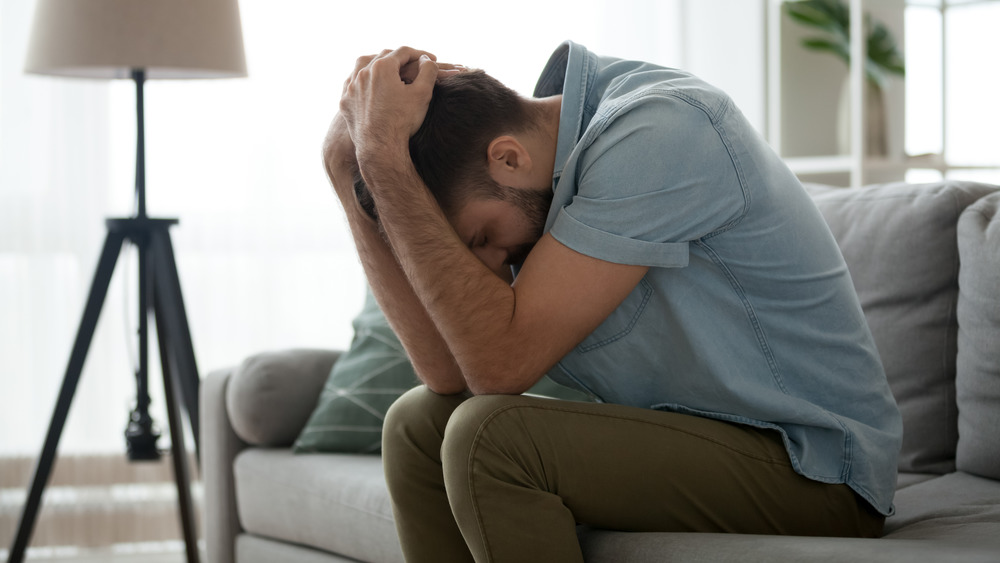
Shutterstock
If you’ve ever had an anxiety attack, you’ve probably heard someone say to “just calm down,” and you probably know that it’s just not that simple. After all, if you could just flip a switch to turn off your anxiety, everybody would do it. Unfortunately, that’s not the case. Often with anxiety attacks, you feel completely out of control, according to Better Help, an online therapy platform.
“One of the most prevalent fears people have is that of losing control — this is the fear that if you don’t manage to control the outcome of future events, something terrible will happen,” explains Dr. Elliot D. Cohen for Psychology Today.
He goes on to explain the irony in the demand for certainty in a world that’s “always tentative and uncertain.” This unrealistic need to control every outcome is both a cause and a product of anxiety. He says that the “demand for certainty and the reality of uncertainty” will continue to play out in a vicious cycle without resolution. “So, the key to controlling your losing-control anxiety is letting go of your demand for certainty — in other words, giving up your unrealistic perfectionism about reality.”
You’ll probably experience some chest pains or tightness
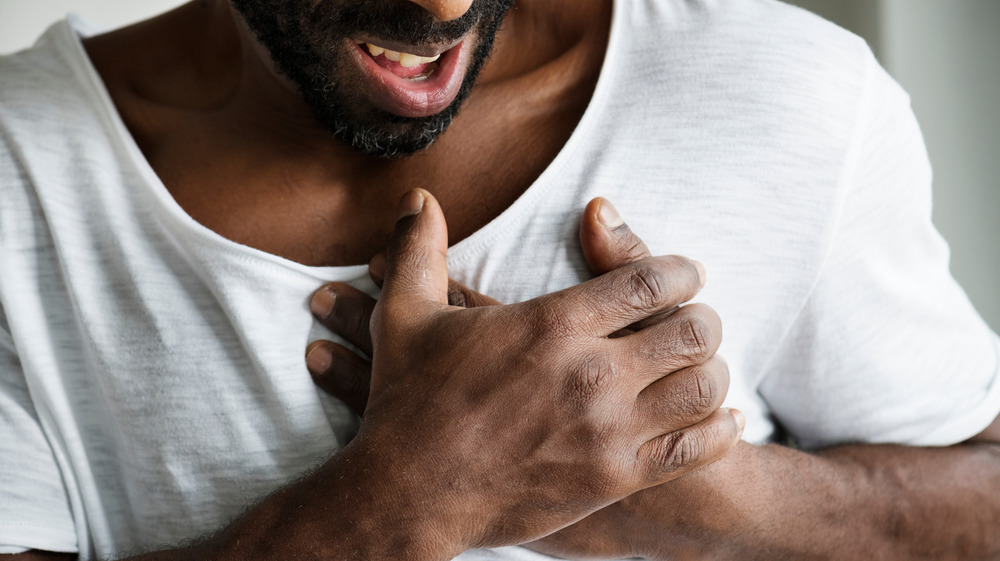
Shutterstock
During an anxiety attack, it can feel like an elephant is sitting on your chest. According to online therapy platform, Better Help, chest pains and tightness are typical symptoms of anxiety attacks. You may feel chest tightness for a bunch of reasons, from muscle strain to gastroesophageal reflux disease (GERD), a condition in which stomach acid travels back up your stomach to your esophagus (the tube connecting your stomach to your mouth), according to Healthline.
GERD can cause a burning sensation in your chest, cause chest pain, make it difficult to swallow, and give you “the sensation of a lump in your throat.” There’s no scientific research that purports a direct link between anxiety and GERD, but studies do show a connection between the two. For example, a 2024 study published in the World Journal of Gastroenterology finds that anxiety and depression increase your risk of GERD, and another study published in Gastroenterology Research finds that GERD’s negative effect on your quality of life can increase anxiety and depression.
You may experience trouble sleeping
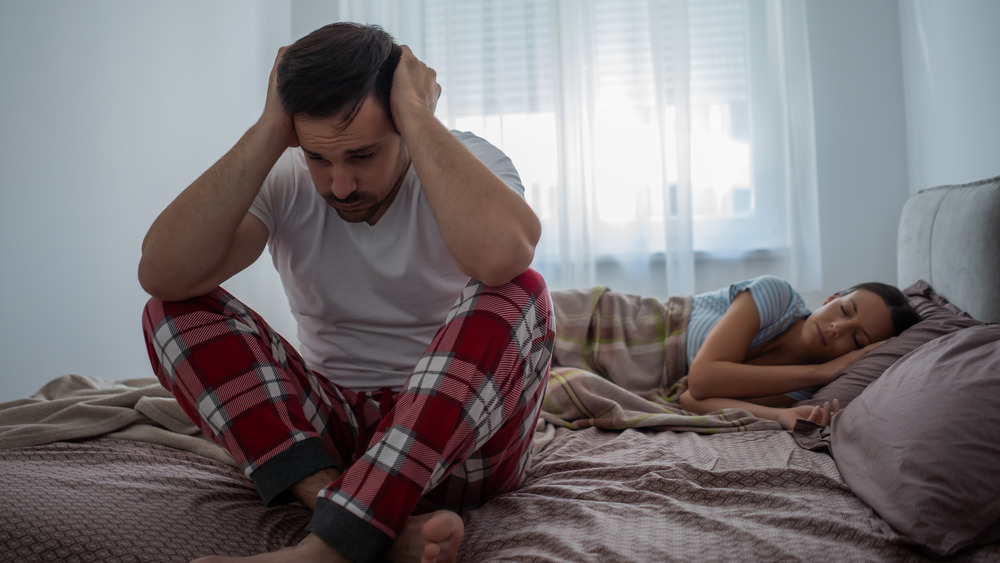
Shutterstock
It probably comes as no surprise that anxiety attacks can give you a whole lot of trouble sleeping. According to online therapy platform, TalkSpace, sleep problems, such as difficulty falling or staying asleep and restlessness are all symptoms of anxiety attacks. And, since a lack of sleep can amplify anxiety, according to VeryWellMind, insomnia and anxiety can quickly spiral into a cycle.
“Many people with anxiety disorders have a difficult time managing negative thoughts and worries,” writes Dr. Katharina Star for VeryWellMind. “Regardless of the source of your worry, these feelings of uneasiness can also be a source of stress that prevents you from getting a good night’s rest. Worrying at night can make it difficult to shut off your mind and get the rest you need.”
Fortunately, there are treatments for insomnia, including cognitive-behavioral therapies, the use of medications (such as benzodiazepines, nonbenzodiazepines, and melatonin), meditation techniques, and more, according to the SleepFoundation.org. Getting your sleep cycle back on track can, in turn, help relieve your anxiety.
You may tremble or shake
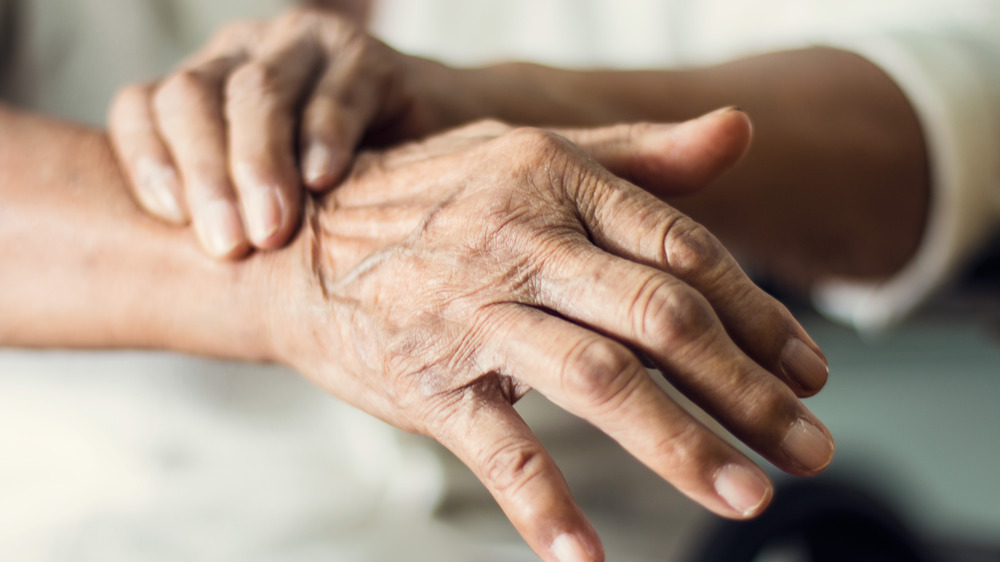
Shutterstock
According to VeryWellHealth, trembling and shaking are common symptoms of anxiety attacks. You might first feel your fingers and hands tremble, which makes it “difficult to hold small objects like a pen, utensils, or your phone,” for example. From there, it may worsen so that your whole body starts shaking. At that point, you might find it hard to simply stand up straight or keep composed at all. These involuntary bodily shakes, called psychogenic tremors, according to Healthline, are believed to be an overreaction of your sympathetic nervous system.
Basically, the body interprets your anxiety as a signal to stand your ground or get away quickly. So, trembling happens because your muscles tense up to fight or to “take flight.” While catching a case of the shakes can feel scary, practicing calming techniques to lower your heart rate, slow down your breathing, and relax your muscles will help to stop the trembling, too.
You may feel like you’re dying

Shutterstock
According to the Anxiety and Depression Association of America, “an estimated 284 million people worldwide have an anxiety disorder.” In fact, in America alone, “an estimated 31.1% of US adults experience any anxiety disorder at some time in their lives.” While anxiety is common, it’s nothing to brush off your shoulders. When an anxiety attack strikes, it can quite literally feel like you’re dying, according to VeryWellHealth.
While stress really can take a toll on your physical health that could take your life in the long run, an anxiety attack is unlikely to actually kill you, according to The American Institute of Stress. Fortunately, there are ways to curb this anxiety.
“Your mind can play tricks on you, and it can feel like you are dying because of the physical symptoms, but if you tell yourself you are going to be okay, it can help to calm yourself down,” Celeste Viciere, a licensed mental health counselor who provides cognitive behavioral therapy, told Healthline. Practicing meditative techniques will help you calm down.
Your blood pressure goes up
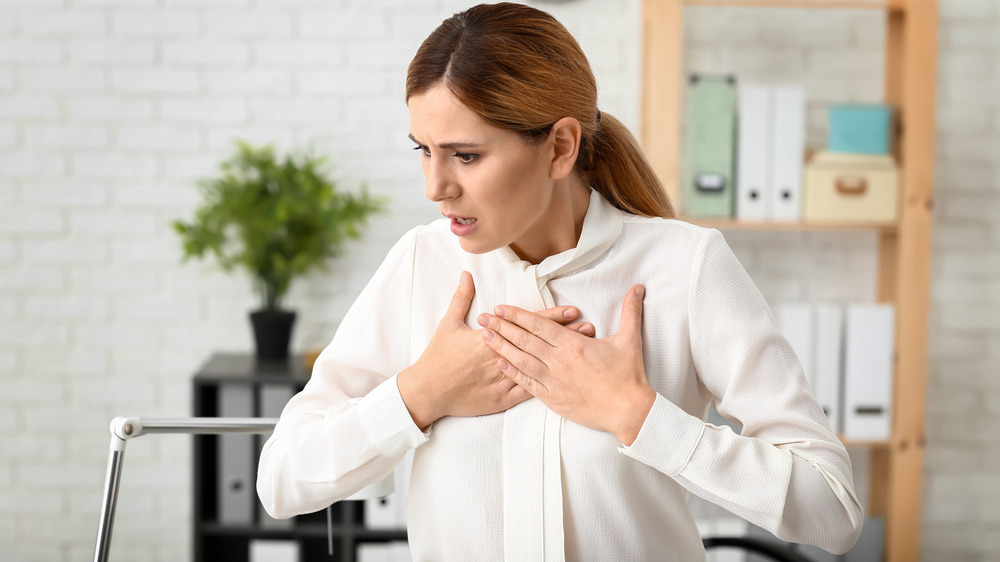
Shutterstock
When you’re having an anxiety attack, your blood pressure increases, according to Calm Clinic. This is because you produce adrenaline, which causes your heart to speed up blood around your body, and you may hyperventilate, which constricts your blood vessels. Rest assured, however, that your body is physically designed to handle increases in blood pressure.
“Whenever you go for a run, for example, your blood pressure experiences a significant spike,” explains Micah Abraham, a Calm Clinic expert. “The reality is that spikes in blood pressure at all ages and with all types of heart health are normal, and your body is designed to handle them.” He adds that your body experiences spikes in blood pressure every single day, and you turn out just fine. Your heart, eventually, always returns back to its baseline. And, it’s your baseline that’s important in determining your blood pressure and overall heart health.
Your cortisol levels increase
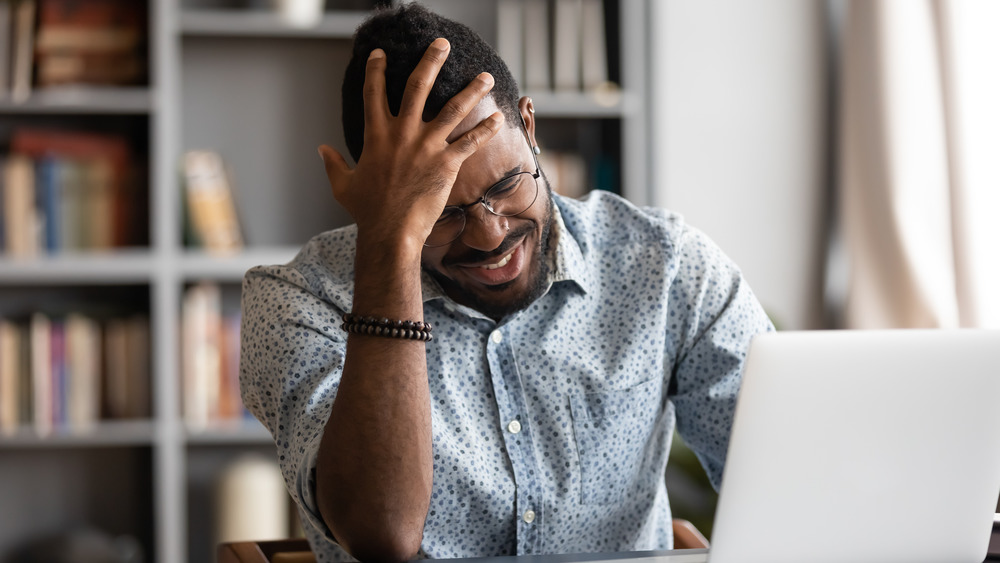
Shutterstock
Cortisol, the stress hormone, increases during anxiety attacks, according to a study published in The American Journal of Geriatric Psychiatry. While this is a completely normal occurrence, it’s important to stay on top of your stress levels. After all, have you ever heard the saying, “stress kills”? According to MayoClinic, chronic stress can wreak havoc on your physical and mental health.
Cortisol is a necessary hormone, according to MayoClinic. When you encounter a perceived threat, the hypothalamus region of your brain alarms your body, which then releases a surge of hormones, including adrenaline and cortisol. While the adrenaline increases your heart rate, boosts your blood pressure, and ultimately amps up your energy to fight or take flight, cortisol increases the glucose (sugars) in your bloodstream. This increases the availability of substances that repair your tissues. Additionally, cortisol restricts any functions that are nonessential or that could be detrimental in dangerous situations.
But too much cortisol can be problematic. If your stress response is always switched on with regular anxiety attacks, for example, it can disrupt all of your body’s processes, leading to a whole host of health complications that, over time, could do some serious damage.

